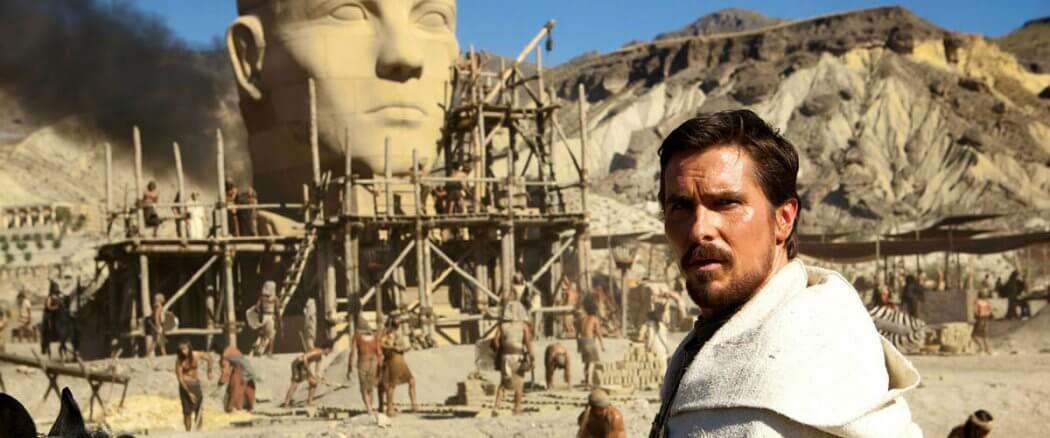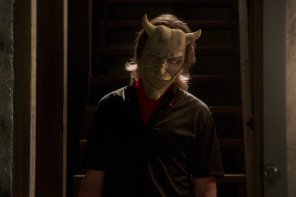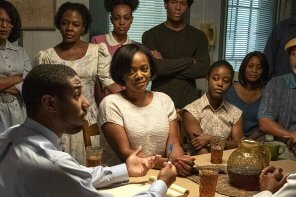If you are anything like me, you’ve seen a variety of big screen portrayals of the Exodus story but the most compelling is still Cecil B DeMille’s The Ten Commandments. Even though I am very well versed in the biblical narrative and culture of this incredible event, my mental image of Moses is still a gray bearded Charlton Heston standing before Pharaoh and declaring in his distinctly booming voice, “Let my people go!”
I realize I’m late to the game in finally watching Exodus: Gods and Kings, but I just wasn’t interested. When I initially heard of the project I was excited to see another rendition of this classic story come to life on the big screen. Then, I heard Ridley Scott was directing this film and lost feeling in my fingers. Don’t get me wrong, I like Ridley Scott’s work and Gladiator stands as one of my favorite films, but the problem is that Scott often (if not always) uses violence as a main character in his films. And the producers of Gods and Kings were quick to point out the link by saying everywhere they could, “From the director of Gladiator.”
This made me fear the worst, and so I kept my head down and avoided eye contact until my son (yes, my 12 year old son) brought the DVD home from the library for us to watch. And so I gave in.
Creative License
Through the beginning, my worst fears were being realized. Moses was being set up as the second most powerful general in all of Egypt. Now, I get it. The biblical story gives scant detail on the real life of Moses beyond the fact that “he was adopted into Pharaoh’s household.” The reality was that Pharaoh had literally hundreds of daughters and possibly a thousand grandchildren and most likely would not have ever known who this adopted Hebrew Moses ever was. (You certainly don’t think they’d banish an important member of Pharaoh’s family for simply killing someone – Pharaoh was considered a god and could do whatever the heck he wanted).
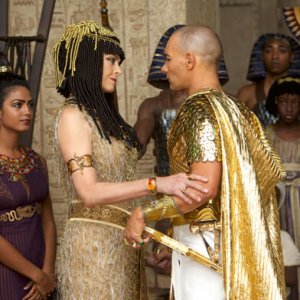 But I get it. Because there are not many details in the text, storytellers have to make up something to get you to emotionally connect to the character. I have no problem with this. Any of it.
But I get it. Because there are not many details in the text, storytellers have to make up something to get you to emotionally connect to the character. I have no problem with this. Any of it.
I didn’t even have trouble with the filmmakers portraying God as a young boy. I actually thought this was a creative streak of genius to really make this movie stand out.
Apart from casting white characters to portray north African history, the film had a real chance at genius. Of course Moses would have been a product of his Egyptian culture and most presumably been a man dictated by violence (as evidenced that Moses actually killed a man in real life). Ridley Scott goes out of his way to make Moses seem a bit mentally unstable in reaction to his burning bush encounter and this too, I thought, was refreshing and truly humanized this mythical figure. Halfway through I thought there was a chance at a creating a masterpiece. Moses goes back into Egypt still trusting in his violent skills to set the people free, and I was just waiting for that moment when Moses would renounce his violent pursuits and trust in God’s power to deliver the people.
Waiting. Waiting. Waiting.
And then my hopes were crushed. No, Moses did not renounce his violence. Instead, a much worse scene unfolded – God joined in on the violence. The young boy portraying God, or the messenger of God, contoured into a God who would seek out revenge and vengeance upon the arrogant Pharaoh. Ridley Scott’s god was truly acting like a little boy who suddenly found himself with a little power.
This movie had every chance at greatness, but instead it devolved into propaganda that was either anti-mean-god or pro-Egyptian…I could not tell which. At no point was there ever an attempt made to establish an emotional connection with the enslaved Israelites who had suffered for 400 years in slavery and were living in deplorable conditions. Instead, I was drawn in to almost feel sorry for the Egyptians who were suffering under the seemingly vengeful and violent wrath of this child-like god.
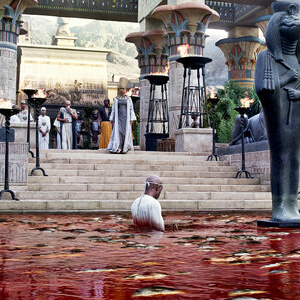 Might it be noted that the judgment God brought upon Egypt in the form of the 10 plagues might seem mean and vengeful to us, but it was not. In fact, the text goes out of its way to show that each of the plagues that Egypt suffered under was solely directed at the Egyptian economy. The 10 plagues were economic plagues hitting the nation at the heart of their oppressive pathology.
Might it be noted that the judgment God brought upon Egypt in the form of the 10 plagues might seem mean and vengeful to us, but it was not. In fact, the text goes out of its way to show that each of the plagues that Egypt suffered under was solely directed at the Egyptian economy. The 10 plagues were economic plagues hitting the nation at the heart of their oppressive pathology.
The Egyptians had used the Israelites as slaves and profited off their suffering. They siphoned the life of the Jewish people and profited from their despair for 400 years! That is a really long time. Egypt had one of the greatest economies in the world, and thus one of the greatest militaries in the world, solely because it had one of the largest slave labor forces in the world. And if there’s anything you should know about Israel’s God, it is that this God will not allow oppression to last – judgment always comes. And so it did to Egypt – striking the artery of their economy – the Nile, then their livestock, their crops, even their stored grains. Then humiliating the primary Egyptian god – the Sun god by casting darkness upon the land.
Yes, the final plague is hard to swallow – that God would allow the firstborn of Egypt to die. To the modern reader it seems incredibly violent. Truly, it is sad and I cannot fully explain it. But Pharaoh was given every opportunity to relent, to let the people go, but he could not. Pharaoh had once killed the firstborn of Israel, had enslaved the people, and in encountering the power of the God of Israel had flipped Yahweh the bird. If the plagues would have continued, all of Egypt would have been destroyed and leveled to the ground. God spared Egypt in the end. Yes, there was great cost, but under what circumstances would the most powerful person in the world agree to give up the slave labor that generated the wealth and power that his entire rule was based upon?
Moses Holding Onto His Sword
If you are familiar with the Hebrew Scriptures, you will know that Pharaoh is the ultimate villain. His violence heaped upon the Israelites is overwhelming and destructive. Yes, Moses would have been formed by this violence, but again, the biblical text does back flips to show that the ways of this God of Israel are not violent, but rather powerfully striking the heart of an economic beast that consumed people’s futures.
I rather enjoy creative license in biblical films, but I don’t like the attempt of filmmakers to use the biblical narrative to turn us against God and to make us feel as if we want to embrace the oppressors. Yes, God loves the oppressors as well, but we must all be honest about what is going on and the reality that violence and cruelty destroy the life of both the oppressors and the oppressed.
In the end, and through to the very last scene, Moses could not put down his sword. To the end, he held on to his Egyptian culture and identity and never truly embraced the God of Israel. This movie was not about Moses – it was about something else – and in typical Ridley Scott fashion, it was about embracing violence as the only true god on earth. This left me feeling a great sadness. This was truly a big budget storytelling blunder.
As the great theologian Stanley Hauerwas says, “To live in the light of the resurrection is to refuse to use the powers that crucified Jesus in the name of achieving justice.”

